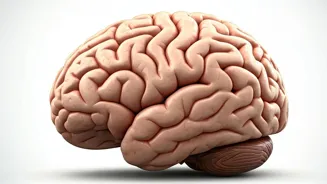Sleep, Hydration, Diet
Adequate sleep is fundamental to brain health. During sleep, the brain consolidates memories and clears out toxins. Aim for 7-9 hours of quality sleep each
night. Dehydration, conversely, impairs cognitive functions, and even mild dehydration can lead to concentration problems and fatigue. Drinking sufficient water throughout the day is essential. A balanced diet rich in fruits, vegetables, and healthy fats provides the nutrients your brain needs to function optimally. Include foods high in antioxidants, like berries and leafy greens, to protect your brain from damage. Consuming processed foods and excessive sugar can negatively impact brain health, potentially leading to cognitive decline over time. Limiting these foods will support better brain function.
Exercise and Activity
Physical activity is a powerful tool for enhancing brain health. Regular exercise increases blood flow to the brain, providing more oxygen and nutrients, which promotes the growth of new brain cells and improves memory. Aim for at least 150 minutes of moderate-intensity exercise per week. Activities such as brisk walking, jogging, or swimming are beneficial. Beyond physical exercise, mental stimulation is equally important. Engaging in activities that challenge your brain, such as reading, puzzles, learning a new skill, or playing strategy games, can strengthen cognitive functions and help keep your mind sharp. Make it a goal to incorporate regular movement and cognitive challenges into your daily routine to reap significant benefits.
Mindfulness and Stress
Chronic stress is detrimental to brain health, potentially shrinking the brain regions associated with memory and learning. Practicing mindfulness techniques like meditation or deep breathing exercises can help manage stress and improve mental clarity. Regular mindfulness practice can alter the brain's response to stress, promoting emotional regulation and reducing anxiety. Additionally, building strong social connections is vital for mental well-being. Social interaction provides emotional support and cognitive stimulation, positively impacting overall brain health. Prioritize your mental health by incorporating stress-reducing activities into your routine, cultivating meaningful relationships, and managing your time effectively to minimize stress.
Harmful Habits to Avoid
Several habits can be detrimental to brain health. Excessive alcohol consumption and smoking can damage brain cells and impair cognitive functions. Limit alcohol intake and avoid smoking altogether. Furthermore, prolonged exposure to environmental toxins can negatively affect brain health. Minimize exposure to pollutants and toxins whenever possible. Poor posture can also influence brain function by restricting blood flow. Make a conscious effort to maintain good posture while sitting and standing. Moreover, prolonged screen time and insufficient mental breaks can lead to mental fatigue and decreased cognitive performance. Take regular breaks to rest your eyes and mind while working on digital devices to support optimal brain function.





















